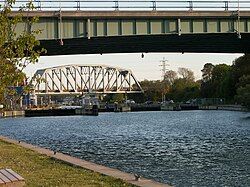Shinnecock Canal Railroad Bridge
Shinnecock Canal Railroad Bridge | |
|---|---|
 The Shinnecock Canal Railroad Bridge, seen in the distance, behind the canal's locks | |
| Coordinates | 40°53′15″N 72°30′05″W / 40.887436°N 72.501302°W |
| Carries | LIRR Montauk Branch |
| Crosses | Shinnecock Canal |
| Locale | Smithtown, Suffolk County, New York |
| Other name(s) | K4 Bridge |
| Owner | Metropolitan Transportation Authority |
| Maintained by | Long Island Rail Road |
| Characteristics | |
| Design | Truss bridge |
| Material | Steel |
| Total length | 316 feet (96 meters) |
| Height | 22 feet (6.7 meters) |
| Rail characteristics | |
| No. of tracks | 1 |
| Track gauge | 4 feet, 8+1⁄2 inches (220 millimeters) (Standard gauge) |
| History | |
| Opened | 1931 (current bridge) 1870 (original bridge) 1891 (second bridge) |
| Rebuilt | 1891, 1931 |
| Location | |
 | |
The Shinnecock Canal Railroad Bridge (also known as the K4 Bridge) is a railroad bridge carrying the Montauk Branch of the Long Island Rail Road over the Shinnecock Canal in Hampton Bays and Shinnecock Hills, Suffolk County, New York, United States.
Overview
[edit]The Shinnecock Canal Railroad Bridge stands at a height of approximately 22 feet (6.7 meters) above the water and measures 316 feet (96 meters) in length.[1][2][3][4] The bridge is constructed of steel and uses a truss design.[3][4]
As Pennsylvania Railroad K4 class steam locomotives regularly crossed the bridge following the replacement of the second span, the bridge became commonly known as "K4 Bridge."[4] Prior to the current span's construction, these locomotives were unable to cross the bridge due to their weight.[4]
The bridge's NYSDOT bridge identification number is 7710170.[3]
History
[edit]The original bridge was constructed in 1870.[1][2][4][5] This girder bridge was replaced by the second bridge – an iron truss bridge – in 1892, as part of the widening of the Shinnecock Canal.[1][2][4][5] Its construction would enable trains using the Montauk Branch – which predates the canal – to travel over the new waterway.[1][3] It was replaced by a new, near-identical span adjacent to it in 1931; this third bridge, which remains in use today, was placed into service on June 21 of that year.[1][4]
See also
[edit]References
[edit]- ^ a b c d e Keller, David; Lynch, Steven (2005). Revisiting the Long Island Rail Road: 1925-1975. Images of Rail. Arcadia Publishing. ISBN 9780738538297.
- ^ a b c Seyfried, Vincent F. (1975). "Part Six The Golden Age 1881-1900". The Long Island Rail Road: A Comprehensive History. Long Island: Vincent F. Seyfried. Archived from the original on April 19, 2015.
- ^ a b c d "NYSDOT Bridges". data.gis.ny.gov. Retrieved 2025-01-06.
- ^ a b c d e f g "LIRR - Shinnecock Canal". www.trainsarefun.com. Retrieved 2025-01-06.
- ^ a b Longi, Mohammad S. (1988). "Long Island Rail Road Bridge Infrastructure" (PDF). Transportation Research Record. 1177: 113–123. Retrieved 2025-01-05.
